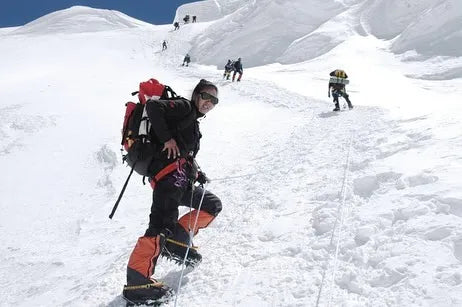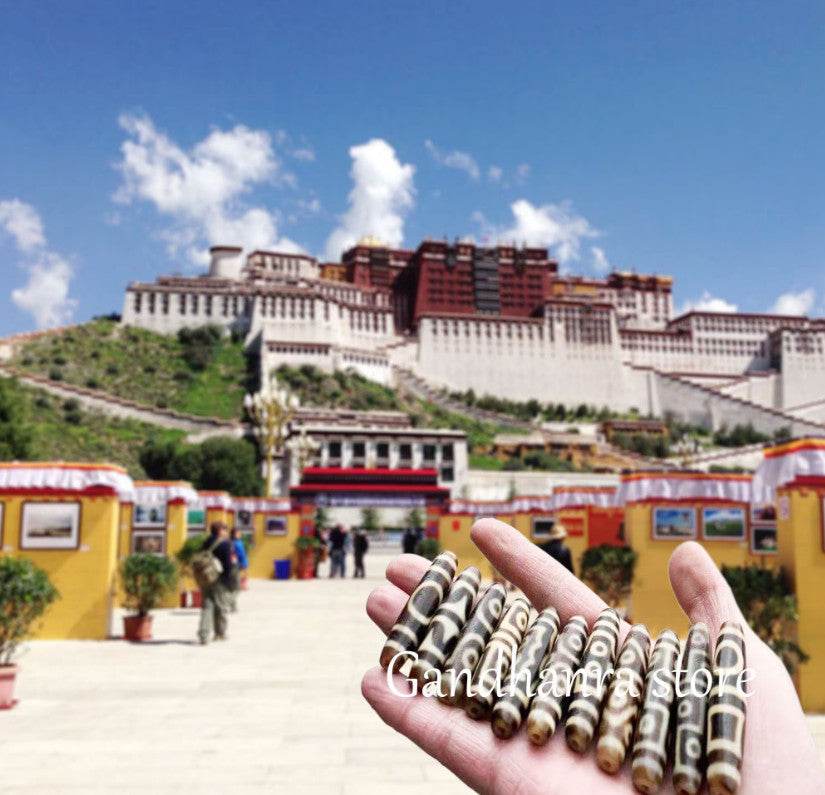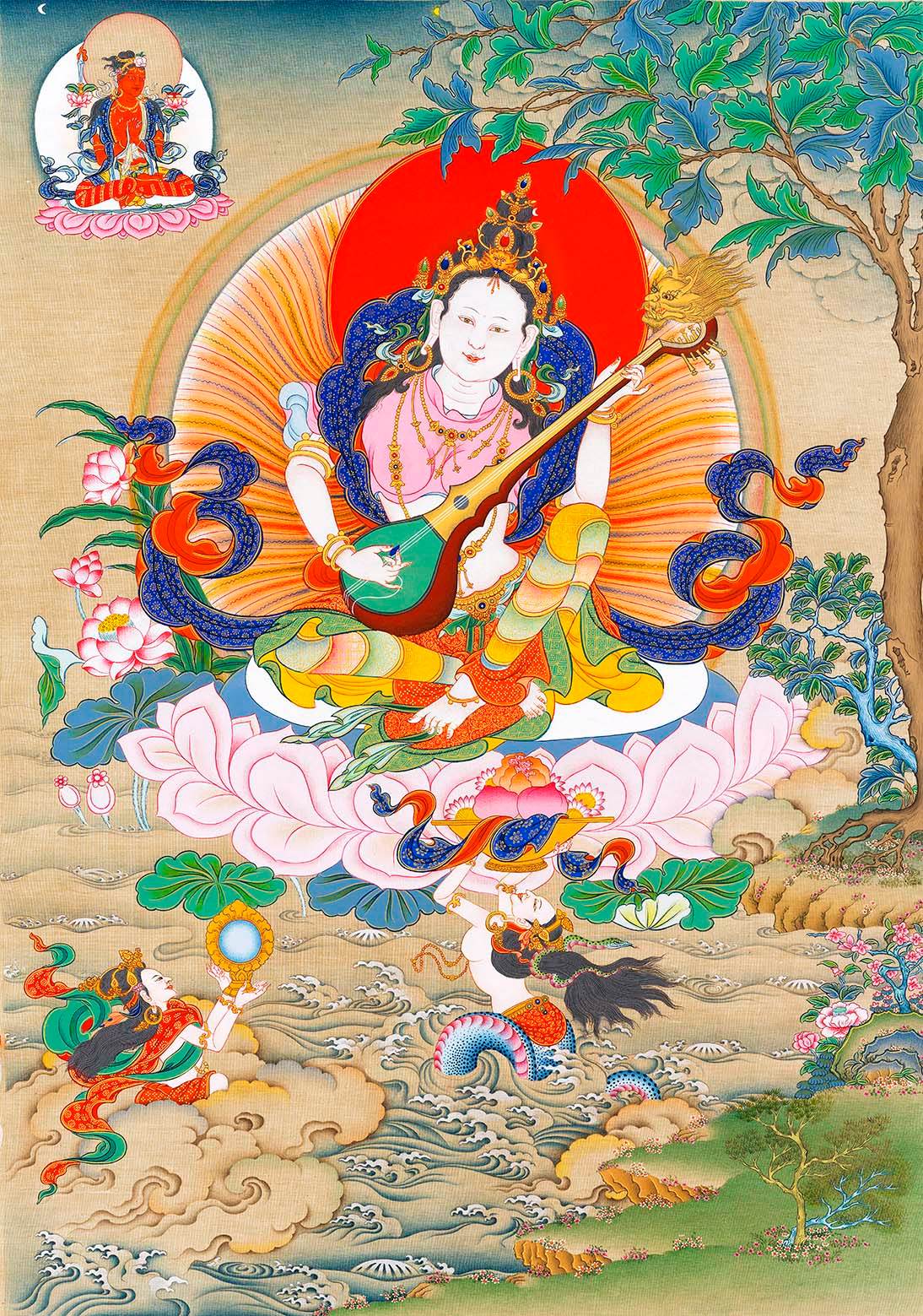
A woman who has reached the summit of Mount Everest 10 times ▎No mountain is higher than yourself

Queen of Everest - Lhakpa Sherpa
Photo: Lhakpa Sherpa
The woman who has reached the summit of Mount Everest the most times in the world
On May 12, 2022, Nepali woman Lhakpa Sherpa captured global attention by successfully reaching the summit of Mount Everest for the tenth time. Prior to this achievement, she had already set a record with nine consecutive successful ascents of Everest, making her the woman with the most summit successes in the world.
British director Lucy Walker documented Lhakpa’s tenth climb in its entirety. After six years of focusing on Lhakpa’s personal life and the daily experiences of her two daughters, combined with the challenging and extraordinary nature of this particular expedition, Lucy completed this gripping and emotionally powerful documentary: *Queen of Everest: Lhakpa Sherpa*.

Documentary: *Mountain Queen: The Summits of Lhakpa Sherpa* (2023)
Facing the camera and calming her emotions, Lhakpa summarized her tenth summit like this: "This ascent, my tenth summit—I leave my dark past behind me." There was no hesitation or ambiguity in her tone; it was resolute and decisive. These powerful, unyielding words, like a declaration, seemed spoken both to herself and to the whole world.
The tenth summit clearly held extraordinary significance. It meant Lhakpa had completely left her painful history behind. A new world was unfolding before her. She had fulfilled her deepest wish—to change her life and her daughters' lives, to improve the situation for Sherpa women, and to show the world that women are just as capable.

"For 30 years, I have been both a mother and a mountaineer"
Photo: Linea Laterale
There is no doubt that through her actions, Lhakpa has conveyed a powerful message of inspiration not only to Nepal but to women all over the world. At this point, Lhakpa is already 48 years old—nearly half a lifetime for many. But it is not too late.

Her efforts have finally paid off
Photo: yahoo
Aspiring to surpass
As a child, Lhakpa often wondered about the other side of the mountain. Reaching the summit to see for herself became the deepest desire of this little girl. She wanted to witness with her own eyes what kind of people lived beyond the mountains.

"I come from a small village, but I have big dreams."
Photo: Lhakpa Sherpa
However, reality was harsh. Although she grew up in a place of breathtaking natural beauty—like a secluded paradise—it was also bound by rigid moral codes and outdated traditions that fiercely suppressed and prevented Lhakpa from any form of imagination or exploration beyond her world.

A small village near Makalu in the Himalayan valley
Where Lhakpa was born and raised
Photo: Lhakpa Sherpa
Born a girl, Lhakpa was ruthlessly denied the opportunity to receive an education—schooling was exclusively for boys, a rule ingrained in the system. She had to serve as her brother’s "bus," spending four hours each day traveling back and forth on mountain roads to take him to and from school. When she couldn’t hold back and expressed her curiosity and longing for the world beyond to the elders in her family, their response was: "There is nothing out there, only terrifying yetis."

Lhakpa during her time as a guide
Photo: Lhakpa Sherpa
Astonishingly, Lhakpa believed this answer until her adolescence. It was only when she saw Western tourists flocking deep into the Himalayas that she realized the so-called yetis were merely a way for the elders to make her abandon her dreams and conform to the traditional role of local women.

The young Lhakpa, her face already marked with determination
Photo: Lhakpa Sherpa
It was precisely Lhakpa’s dual transcendence—both overcoming the ingrained prejudices and constraints imposed on women by her local society to step into the world, and surpassing physical and natural limits to reach the summit of the world’s highest peak—that captured the attention of director Lucy Walker, who had never met this Nepali woman before. What a remarkable twist of fate it was.
Those who fear no mountain heights carry the summit within.
Lhakpa said, "My life has hurt me. No matter where I go, the pain follows me. Everest made me appear strong. Everest is a queen mountain, and Everest turned me into a queen."
Yet it's hard to imagine that before truly transforming into a "queen," Lhakpa still had an incredibly arduous journey ahead of her. Looking back, this indescribable experience was truly a long night's journey.




When life gets tough,
Lhakpa thinks of her snowy mountains.
Photo: Still from the documentary
When Lhakpa finally used her wit, courage, passion, and effort to gradually approach her beloved mountaineering career by serving as a guide for foreign tourists, stepping out of the encircling mountains, and eventually seizing the opportunity to complete her first successful summit, her fate still saw no substantial change. A failed marriage became yet another immense obstacle, trapping Lhakpa in confinement for a long time.
When the first instance of domestic violence occurred, Lhakpa once thought she would die. In a fleeting hallucination brought on by this near-death experience, her daughter’s face flashed through her blurred consciousness. It was in that very moment that a powerful, instinctive will pulled Lhakpa back from the abyss—she had to set an example of fearless living for herself and her daughter. She had to fight back. Because she could not rely on anyone else for salvation. She had to save herself.

She showed the world what a woman can achieve
Photo: filmmakermagazine
Everything in the world is fundamentally similar. We perceive metaphors about one thing through the experience of another. Just as reaching the summit requires overcoming countless hardships, life, too, demands weathering storms and navigating treacherous paths to see the rainbow and attain peace and fulfillment. Profound and painful transformation is often necessary for rebirth.
Mountain guide, kitchen hand, porter, cleaner, tea house owner, construction worker, Whole Foods dishwasher, laundry worker—Lhakpa could be seen laboring tirelessly in all these roles. Yet through all these twists and turns, she never stopped climbing. Her resilience and astonishingly boundless drive were drawn entirely from the mountain goddess she revered—Mount Everest!

"In my dreams, I see a beautiful snowy mountain.
I climb that mountain, and I grow taller and stronger."
Photo: Still from the documentary
Goddess of the Mountains
Lhakpa said, "In Sherpa culture, Mount Everest means goddess and mother. I respect this mountain as deeply as I respect my own mother." Rather than conquering a mountain, it is more like having a dialogue with it.
For Lhakpa, the significance of Everest is extraordinary. It has never been an object to be conquered. Even though she has reached the summit ten times, Everest remains a goddess in her heart—an unquestionable divine mother mountain. She personifies Everest, interacting with it as a living entity. The place and meaning Everest holds in her heart are comparable to that of her mother.

Lhakpa's father and mother. Her father raised many yaks.
One thing he often told Lhakpa was:
"This earth does not belong to us alone—it belongs to the animals too."
Photo: Lhakpa Sherpa
Lhakpa said, "Mount Everest is my doctor—she heals my soul. I can feel the inner communication between our souls. When life gets difficult, I think of my snowy mountains. The snowy mountains were my childhood companions. I tell Everest, you have given me everything. You are my goddess of the mountains."
Lhakpa uses Everest as her inner reference. To her, Everest is a spiritual leader, a companion, and a source of motivation. The mountain symbolizes a transcendent spirit that stands firm in her heart, unwavering like Everest itself. When she feels lonely, Everest is her listener; when she is weary, Everest offers profound solace; when she is vulnerable, Everest is her strong support; and when she succeeds, Everest remains just Everest—neither joyful nor sorrowful, towering with majestic grace and grandeur, reaching straight into the heavens.

"When you become a mountain yourself,
you can touch the sky, touch the moon, touch the sunrise."
Photo: Still from the documentary
Growing up surrounded by beautiful mountains, as a child of nature, respect for the environment was an innate belief deeply rooted in Lhakpa’s heart. She has always held a profound reverence and awe for the snowy mountains. She understands how to appreciate and honor the sacredness of a mountain. When facing a towering peak, each person gains their own unique enlightenment.




Life at the foot of Mount Makalu, surrounded by nature
Where Lhakpa was born and raised
Photo: Lhakpa Sherpa
The meaning of climbing has never been about conquest. In a sense, a mountain cannot be conquered—it is a beautiful existence. What can be conquered is only the height; humans cannot truly dominate it. Through climbing, one becomes aware of and expands all the new possibilities latent within themselves. Achieving self-transcendence, one enters a new realm.
Just like Lhakpa, she has proven through her own actions that women can stand tall and lofty like Mount Everest, reaching for the clouds. Yet, when facing the snowy mountains, she never forgets to humble herself and bow to their grandeur and majesty.

Lhakpa is happy to help young climbers explore the world
Photo: Gripped Magazine
No empty steps underfoot.
Not a single step taken in hardship is ever in vain. No setback is endured without purpose. No dark journey is unnecessary—each is essential for eventually reaching the light. Everyday tasks can be approached with fresh awareness and clarity, revealing new meaning and yielding new rewards.
Even if every climb ends in a successful summit, the process is always different. Through repeated ascents, Lhakpa’s spirit has been reshaped, tempered, and polished. Everything is a necessary part of the journey—it is through this process that one’s footsteps gradually become firm and resolute.

An endless climb
Photo: Lhakpa Sherpa
Reading a book by an Indian philosopher, a passage in it seemed to perfectly depict Lhakpa.
"You carry a great mountain within you—Mount Everest. Of course, the climb will be difficult. But that difficulty has its rewards, immense rewards. Once you reach the summit, it is the effort, the struggle, the challenges, the hardships of the ascent—something continuously crystallizes within you. The moment you reach the peak, it is not just a mountain you have conquered—you become a mountain yourself. You ascend to a height you never knew before. You once lived in dark depths, but now you dwell in the sunlight."

A rainbow arched over the mountain peak, like a metaphor
Lhakpa gazed at it for a long time—it was nature’s coronation for her
Photo: Still from the documentary
Lhakpa, through her own transformation, has not only realized herself but also inspired others. She has given them boundless strength and light. If we must speak of female power, it is not merely a theory or a slogan—it is action. It is about proving oneself through deeds and offering guidance to others.
She said, "The world is watching. I want the world to see that I am brave. I will take action, like a strong woman. This is who I am—I will not give up. I will climb. This is me."

Lhakpa said, "I want to dedicate my life to the mountains.
I will keep climbing until the day I die."
Photo: yahoo
The fulfillment of one's own life
The film constantly shifts between Lhakpa's past and present through a dual narrative structure.
We can enter this story from three paths, experiencing it from three distinct perspectives, and join Lhakpa on her journey to the summit of her life. First, as an outdoor athlete, how Lhakpa pushed beyond limits to reach the peak. Second, within a broken family, how her two daughters found healing and restoration through their mother's relentless efforts, inspiration, and support. And most importantly, how a woman enduring dark storms yet never broken achieved the fulfillment of her own life with remarkable will and wisdom.

Lhakpa, reborn from the flames
Photo: nytimes
The divine and spectacular natural scenery of the Himalayas, complemented by the vivid warmth of human stories, intertwines seamlessly, blending and weaving together to create a beauty that balances strength and tenderness. This allows the audience’s emotions to move gradually between tension and relaxation.
This is not Lucy’s first time telling a Himalayan story. As early as 2006, Lucy was drawn to the journey of a group of blind Tibetan teenagers climbing Mount Everest on the northern slope. Deeply moved, she created the documentary *Blindsight* based on their experience. Since then, Lucy has maintained a close focus on the human and geographical landscape of Tibet, holding a special affection for it.

*Blindsight* (2006) Poster
Director: Lucy Walker
In an interview with *Filmmaker Magazine*, director Lucy Walker recalled the deeply emotional journey of making *Mountain Queen*. She said, "Being able to share important moments in the lives of my subjects and gradually build genuine emotional connections with them—I cherish such experiences. It is an immense privilege."
"In a sense, making a film is like falling in love with your subjects. If I did not feel love for them, this film would not exist. It is not romantic love, but rather a profound sense of joy, awe, support, and witness that comes from deep within. This precious emotion does not end—even after filming wraps and the film is released, it continues to unfold, grow, and endure."

Before the award ceremony for Lhakpa's tenth summit
Sharing joyful moments with her daughter, though such times were rare
Photo: Still from the documentary
Lucy’s lens does not overly emphasize the fact of Lhakpa’s tenth successful summit but instead focuses on contrasting and presenting Lhakpa’s inner journey leading up to this achievement. This is the most moving aspect of the film. Lucy prefers to dig into and trace the stories deep within her subjects, weaving together countless twists and hardships with dense, profound emotional connections.
This makes it clear that the film is not just an adventure story about pushing natural limits—it is a breathtaking legend of a woman’s life bursting into brilliant bloom atop the highest mountains.

Lhakpa shares her story
Photo: Still from the documentary






